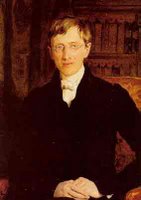The following is the first paragraph of an article published in the British Critic for July 1841. Written in the twilight of Newman's confident Anglicanism, it is a brief - and somewhat biting - judgement of the work of the medieval Catholic theologian, particularly his Catena Aurea (redacted patristic commentary on the Gospels).
"THE name of Aquinas is almost synonymous with all that is popish, superstitious, sophistical, fanciful, and pedantic, in the minds of most of us. We conceive of this great oracle of the Church of Rome, as of one whose life was spent in his closet in busy trifling, in the incessant labour of abstract reasonings upon questions of fact or sacred doctrine, minutely followed out, ingeniously defended, and dogmatically enforced. If there is any thing harsh, corrupt and repulsive in the popular Roman theology, any possible narrowness in an Aristotelian, or any bigotry in a schoolman, we look upon St. Thomas of Aquinum as the type and model of it. Even in the most powerful exercise of his intellect, we expect nothing higher and nobler than the discussion how many spirits can stand on the point of a needle, or whether we are bound to love a possible angel more than an actually existing fly. Yet we now have before us the first portion of a Commentary on the Gospels, not composed indeed, but compiled by him, which certainly gives a very different idea of his character and talents, which has nothing in it but what is grave, impressive, and profitable, and put together with remarkable good sense and skill; and, stranger still, which really contains nothing at all, or next to nothing, of those corrupt tenets and opinions, which we so much deplore in Romanism."

